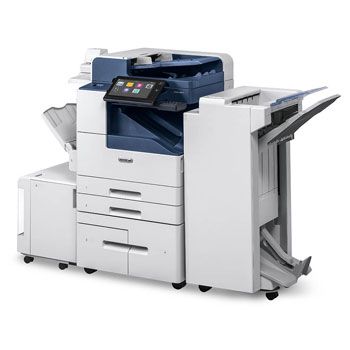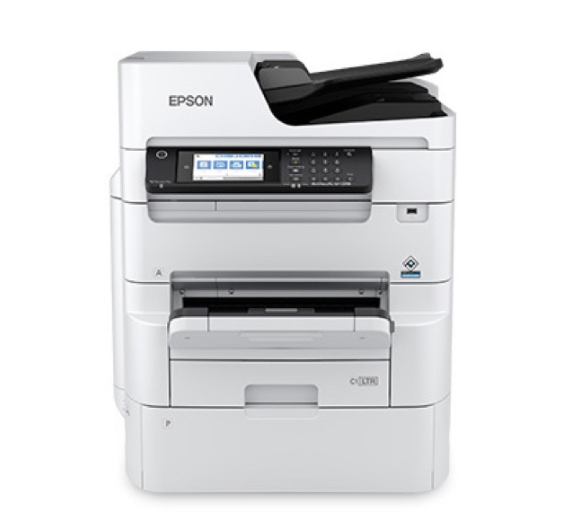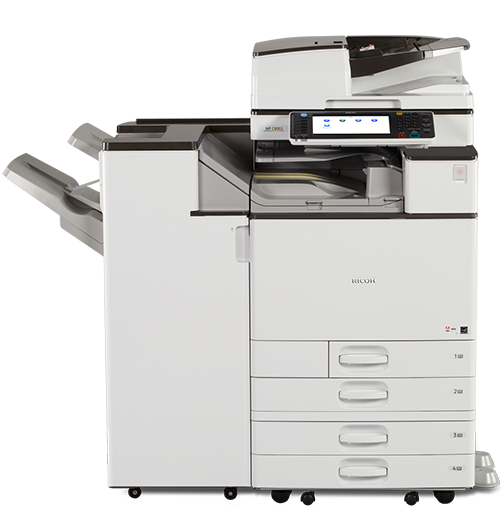Whether copier leases are taxable depends on factors such as the lease type, state tax regulations, and the contractual terms involved. Operating leases typically have sales tax applied to periodic payments, while capital leases may incur upfront sales tax on the total lease amount. Different states have varying rules, with some taxing the entire lease payment and others only the initial acquisition cost. Bundled services complicate matters further, as they can be fully taxable if inseparable from the lease. Consulting tax professionals is advisable to navigate these complexities. To fully understand these intricacies and optimize tax planning, consider exploring further details.
MF Printer Lease Highlights
- Copier leases can be taxable, with the application differing between operating and capital leases.
- Taxation rules on copier leases vary by state, affecting when and how taxes are applied.
- Operating leases typically incur sales tax on periodic payments, while capital leases owe tax upfront on the total amount.
- Bundled services in copier leases might be fully taxable unless services are itemized separately in the contract.
- Consulting tax experts can help navigate state-specific tax regulations and optimize financial benefits.
Sales Tax on Copier Leases

Understanding the intricacies of sales tax on copier leases requires careful consideration of various state taxation rules, which can markedly differ across jurisdictions. The type of lease—whether it's a capital lease or an operating lease—further influences tax obligations, impacting how taxes are calculated and remitted.
Copier and printer leases often encompass complex terms that necessitate a thorough review of associated agreements. Additionally, the inclusion of bundled services, such as maintenance and supplies within the lease agreement, can complicate taxation, requiring precise identification of taxable versus non-taxable elements.
Taxation Rules by State
Across various jurisdictions, the taxation rules applied to copier leases can markedly differ, especially concerning sales tax obligations. Importantly, each state in the United States has the autonomy to enforce its own tax policies, which means that businesses engaged in copier leasing must be cognizant of these diverse regulations. For instance, in some states like New York and California, sales tax is assessed on the entire lease payment, whereas others, like Texas, may only tax the initial acquisition cost of the copier equipment.
States like Florida might choose to impose sales tax at the point of acquisition rather than on the recurring lease payments, while Illinois is known to apply sales tax throughout the entire lease duration. Additionally, there's the concept of "true lease" versus conditional sales, which may influence taxable amounts differently across states. It is also worth noting that some states permit tax exemptions under specific conditions, such as educational or charitable use.
Businesses must maintain an updated understanding of the specific sales tax guidelines related to their operational state. Remaining in compliance demands regular review of state tax codes, which guarantees seamless operations and fosters a sense of trust and community within professional networks.
Lease Type Implications
Examining the nuances of lease types reveals additional layers of sales tax complexity for copier leases. Distinctions between operating and capital leases can profoundly affect tax obligations. In an operating lease, the lessee pays for using the copier without owning it by the lease's end. Consequently, sales tax is generally applied to each periodic payment. This ongoing taxation approach aligns with the temporary nature of equipment use under operating leases.
Conversely, a capital lease, which often resembles an installment purchase, can imply different tax consequences. If the lessee intends to assume ownership eventually, sales tax may be due upfront on the entire lease amount. This is because capital leases are treated as sales, transferring ownership benefits and obligations earlier in the agreement.
Comprehending these distinctions guarantees businesses remain compliant with tax regulations and their financial expectations are accurately managed. Additionally, lease agreements may vary regarding included services and maintenance, influencing tax calculations further. For businesses to make informed decisions about copier leases, engaging professionals for guidance is prudent. With proper analysis, firms can navigate the complexities of lease types, mitigating unexpected tax liabilities smoothly.
Bundled Services Taxation
In the domain of copier leases, bundled services present a unique layer to sales tax calculations. When a copier lease includes both the equipment and additional services, such as maintenance and supply replenishment, determining the taxable amount can become complex. Each state may have specific guidelines; however, the general principle involves distinguishing between taxable tangible goods and non-taxable services.
In many jurisdictions, if services are inseparable from the lease of the equipment, the entire package may be taxable. This is because bundled pricing lacks the clarity to differentiate how much of the payment is for the equipment versus the included services. Conversely, if a lease explicitly itemizes these components, it might allow service costs to be exempt from sales tax, thereby reducing the taxable amount payable.
Moreover, in scenarios where leases offer optional services, distinguishing them in contracts can affect tax obligations. Companies that navigate these complexities effectively can achieve considerable tax savings, thereby making leasing arrangements more favorable to their financial plans. Understanding and applying sales tax regulations accurately within bundled services is essential, ultimately enhancing compliance and fostering favorable fiscal outcomes for businesses.
Reliable Office Equipment Solutions for Your Business
At Reliable Office Equipment Solutions, we ascertain the pivotal role that efficient office equipment plays in the success of your business. Many businesses are discovering that leasing office equipment can be a cost-effective solution due to its affordability and flexibility.
Our comprehensive services are designed to provide you with the best solutions tailored to your unique business needs, including copier leasing, which can help streamline your operations while staying within budget. We furnish a wide range of top-tier copiers and multi-function printers, guaranteeing you have access to the latest technology without the burden of upfront costs.
Our leasing agreements are transparent and customizable, providing tax advantages and operational flexibility. Our dedicated team is committed to delivering exceptional customer service, from installation and maintenance to ongoing support. By partnering with us, you can focus on growing your business while we safeguard your office equipment runs smoothly and efficiently.
Benefits

When considering copier leases, businesses can leverage several key benefits such as cost management advantages, which help stabilize operating expenses over time. Leases often provide flexible payment options, allowing companies to manage budgets effectively while gaining access to the latest technology without the burden of large upfront costs.
Not only does leasing allow organizations to efficiently manage their finances, but it also offers the versatility necessary to keep up with diverse business needs. This can lead to improved cash flow, as organizations avoid significant capital expenditures and maintain liquidity for other strategic initiatives.
Cost Management Advantages
Although businesses must allocate resources efficiently, copier leasing offers significant cost management advantages. Leasing is not merely a financial measure but a strategic asset management decision that enhances operational efficiency. Many organizations recognize that leasing can help streamline expenses, an important factor in today's competitive landscape.
Predictable Costs: Copier leasing provides a predictable monthly expense, which helps in budget planning and financial forecasting. This predictability aids organizations in avoiding unforeseen capital expenditures, allowing a smoother financial operation.
Reduced Maintenance Costs: Most leasing arrangements include maintenance provisions, meaning the lessee does not bear additional costs for repairs or periodic servicing. This alleviates potential disruptions and financial burdens, guaranteeing devices remain functional with minimal fuss.
Access to Updated Technology: Technology evolves swiftly, and leasing affords businesses regular upgrades. Such access ensures companies remain at the forefront of efficiency, reducing the risk of obsolescence without heavy investments.
Tax Deductibility: Lease payments can often be deducted as a business expense, creating significant tax advantages. By structuring these costs effectively, companies can maximize their tax positions while maintaining ideal operational capacity.
Flexible Payment Options
Flexible payment options are a compelling benefit of copier leasing, allowing businesses to tailor financial commitments according to their specific needs. By providing a variety of payment structures, copier leases offer greater financial flexibility, which can be imperative for companies aiming to manage cash flow effectively. This adaptability means that businesses can opt for payment plans that align with their budgeting strategies, potentially easing financial pressure and facilitating smoother operations.
Monthly, quarterly, or annual payment plans offer the predictability required for stable financial planning, enabling businesses to forecast expenses more accurately. This is especially beneficial for small to medium-sized enterprises that may not have the immediate capital to commit to a full purchase. Additionally, structured payment schedules can be customized to match revenue streams, ensuring that company finances are not strained at times when funds are less accessible.
Flexible payment options also afford companies the ability to scale their operations without incurring prohibitive upfront costs, fostering a sense of belonging within a competitive marketplace. By aligning payment terms with business objectives, organizations can optimize their financial strategies, allowing them to focus on growth and evolution within their respective industries.
Access to Latest Technology
Beyond the financial flexibility offered by copier leasing, businesses gain the vital advantage of accessing the latest technology. Leasing copiers allows organizations to stay current with cutting-edge advancements without committing to substantial upfront purchases. By leasing rather than buying, companies can integrate state-of-the-art technology into their operations, fostering enhanced productivity and efficiency. This is especially important in competitive industries where technology rapidly evolves and maintaining an edge is essential for success and belonging within the business community.
Continuous Upgrades: Leases often include the option to upgrade equipment, facilitating access to the newest innovations which enhance operational efficiency.
Reduced Obsolescence: Leasing minimizes the risk of technology becoming outdated, ensuring that businesses maintain relevance and competitiveness.
Increased Productivity: Advanced features available in newer models can dramatically boost productivity, directly impacting success and employee satisfaction.
Competitive Edge: Staying updated with technology can distinguish a business from its competitors, nurturing a sense of pride and belonging among employees and stakeholders.
Improved Cash Flow
Effective cash flow management is essential for the sustainability and growth of any business. Leasing copiers can substantially contribute to improved cash flow, providing companies with a more predictable expense structure. Unlike purchasing office equipment outright, which can involve significant upfront costs, leasing spreads payments over time, preserving valuable working capital.
This approach allows businesses to allocate resources more effectively, guaranteeing that funds remain available for other critical investments or operational needs. Additionally, since lease payments are often fixed, businesses can better forecast their expenditures, enhancing overall budget management and reducing financial stress. This stability is particularly attractive to companies seeking to maintain a healthy cash flow balance.
Additionally, copiers often come with rapidly advancing technology, which can quickly make purchased equipment obsolete. Leasing affords businesses the flexibility to upgrade at the end of a lease term without incurring the considerable depreciation costs associated with owning such equipment. This adaptability not only prevents financial strain but also ensures continual access to the most efficient and productive tools.
Details About Service Locations

Understanding service locations is vital when considering copier leases, as it can noticeably impact business operations and support efficiency. An examination of these factors can be structured in terms of regional service coverage, on-site support availability, and geographic restrictions. The table below provides a concise overview of these essential service considerations:
| Service Aspect | Description | Impact on Business |
|---|---|---|
| Regional Service Coverage | Areas where the service provider operates | Affects accessibility |
| On-site Support Availability | How frequently technicians are available on-site | Influences downtime |
| Geographic Limitations | Restrictions based on location | Limits service options |
Regional Service Coverage
When considering copier leases, it's essential to evaluate the regional service coverage provided by the leasing company to guarantee their support aligns with your geographical needs. Understanding this coverage ensures that your business receives timely and efficient service, fostering a smooth operational environment. Organizations often differ in their service location offerings, which can drastically impact the accessibility and speed of responses to service requests.
Service Network Reach: Assess the breadth of the leasing company's service network, which includes the number of service centers and their proximity to your location.
Response Time: Determine the average response time from the nearest service center. Quicker response times ensure minimal downtime for your operations.
Location Saturation: Know how well the company covers your entire region, ensuring no part of your business is left underserved.
Service Staff Availability: Evaluate the number of technicians in your area, as more technicians can result in faster service intervention.
These elements are imperative, as well-connected service networks ensure ongoing productivity and foster a sense of belonging and reliability within your organization. Prudent evaluation of regional service coverage fosters confidence and operational integrity.
On-site Support Availability
Evaluating on-site support availability is essential to determine the efficiency and reliability of a copier leasing company. Prompt and effective on-site support is a critical factor that can influence the overall satisfaction and experience of a customer. When a copier malfunction occurs, having trained technicians readily available to provide timely repairs minimizes downtime, ensuring that business operations continue smoothly.
Leasing companies often outline their on-site support policies in service agreements, indicating response times and the scope of support provided. Detailed agreements include details regarding technician visits, spare part availability, and any additional fees for urgent requests. Businesses can inspect these agreements to select a provider whose on-site support aligns with their operational needs.
Additionally, examining the proximity and availability of a company's service locations adds further insight into the support infrastructure. Closeness to centralized locations can suggest faster response times. Customers should consider the service density in their locality to predict realistic support timeframes, which affects overall operational efficiency.
Geographic Limitations Considerations
Considering service availability, geographic limitations play an integral role in evaluating the feasibility of a copier lease. Companies must assess whether the copier service provider can offer timely and efficient support within their location. Proximity to service centers can impact response times and service quality, influencing operational continuity.
- Service Radius: Verify that the leasing firm supports your area and how far their service radius extends. A closer proximity often guarantees faster service response, which is necessary for minimizing downtime.
- Network Coverage: Determine if the provider has a wide network of service technicians and parts warehouses. This ensures that even in remote areas, support and necessary resources are quickly accessible.
- Local Regulations: Be aware of local tax codes and regulations that may affect leasing agreements. These can vary greatly by location and could influence the overall cost-effectiveness of the lease.
- Urban vs. Rural Services: Consider the difference in service availability between urban and rural settings. Urban areas typically enjoy robust service networks, whereas rural regions might experience delays due to fewer resources.
Connect With A Team Member Today!
Ready to take the next step in understanding the tax implications of your copier lease? Our expert team is here to guide you through every detail to guarantee you're making the most informed decisions for your business.
For more information, consider visiting Get in Touch. Don't leave money on the table—contact us today and let us help you navigate the complexities of copier leases and taxes.
Dial (888) 331-7417 now to connect with a dedicated team member and get personalized assistance. Your business deserves the best advice!
Office Equipment Lesing FAQ
Are There Tax Implications for Leasing vs. Purchasing a Copier Outright?
Evaluating tax implications between leasing and purchasing a copier requires consideration of deductibility and depreciation. Leasing typically allows for immediate deductions, while purchasing involves capitalizing and depreciating the asset, impacting financial strategy and tax efficiency within professional environments.
How Do State-Specific Tax Laws Affect Copier Lease Agreements?
State-specific tax laws can greatly impact copier lease agreements by varying tax rates, exemptions, and compliance requirements. Businesses must collaborate with local tax professionals to effectively navigate their region's regulations, ensuring optimized financial and operational efficiency.
Can Maintenance and Repair Costs on Leased Copiers Be Tax-Deductible?
Maintenance and repair costs on leased copiers may be tax-deductible depending on jurisdictional tax laws. It is critical to consult with a tax professional or accountant to guarantee compliance and to optimize potential deductions for your specific situation.
Is Sales Tax Applicable to Consumables for Leased Copiers?
Sales tax applicability on consumables for leased copiers may vary based on jurisdiction. It's important to consult local tax regulations or a tax professional to guarantee compliance and optimize your organization's tax strategy within the legal framework.
What Documentation Is Needed for Tax Filing on Copier Leases?
To accurately file taxes on copier leases, it is essential to gather lease agreements, payment records, and any pertinent invoices. Proper documentation guarantees compliance, provides clarity, and fosters a sense of inclusion within the professional financial community.







